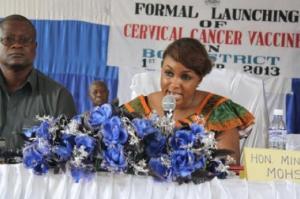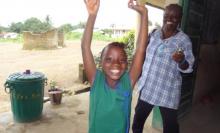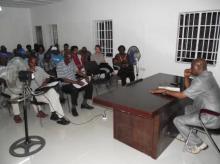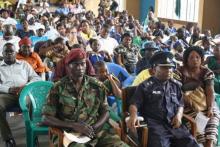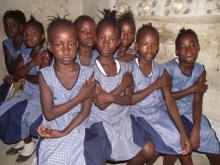Sierra Leone launches Human Papilloma vaccination demonstration project
Cervical cancer is common in women and is responsible for an estimated 530,000 cases and 275,000 deaths yearly globally. The incidence in Sierra Leone is estimated at 670 cases and 466 deaths annually. A comprehensive approach to cervical cancer control includes, immunization of girls ages 9-13 years, screening for precancerous lesions in women and treatment, as well as palliative care for women diagnosed with full blown cervical cancer disease.
A two years demonstration project for Human Papilloma Virus Vaccination (HPV) was approved by the Global Alliance for Vaccines and Immunization (GAVI) in 2012. The project is being conducted in Bo district and targeted girls age nine years nine (9) both in and out of school. Three (3) doses of HPV vaccine will be administered over a period of six (6) months.
The first and second doses were administered in October and November 2013 respectively, while the third dose will be administered in April 2014.
Planning and Coordination
To ensure a successful campaign, proper planning and coordination with various stakeholders was critical. Major stakeholders involved in the campaign include the Ministry of Education Science and Technology, Local Councils and tradition leaders. Agreement on dates for the HPV demonstration project commencement was made based on country situation. Working groups were formed to deliberate on various aspects of the planning, including, training, coordination, logistics, and communication. Local resource mobilisation and involvement of local partners was done with good outcome.
Pre implementation activities
As part of the preparations micro planning was done including listing all schools and communities and eligible girls for vaccination. Data collection tools, training guidelines and communication strategy, and IEC materials were developed. To ensure effective community involvement and uptake of the vaccine, advocacy and social mobilisation activities were carried out and include, radio discussions, street drama performances, chiefdom meetings and launching ceremony.
Selection and training of vaccination teams which include teachers and health workers was done. The training was followed with a Programme readiness assessment using a standard checklist which indicated that the country was ready to implement the HPV demonstration vaccination project. Distribution of vaccines and materials to chiefdoms was done based on the micro plan.
A total of 37,813 doses of vaccines were received and cold chain throughout the exercise. In addition MSF supported the district with icepack freezing during the vaccination period.
Launching of the HPV Demonstration
The HPV demonstration vaccination project was officially launched in Bo district by the Honourable Minister of Health and Sanitation Ms. Miatta Kargbo with the participation of many partners including WHO, UNICEF, GAVI, Sabin institute, Civil Society, NGOs and Local government authorities.
Implementation
Vaccination took place in schools for girls attending schools while those out of school were captured at community level. During this period adverse events following immunization (AEFI) were monitored and there was no severe case of AEFI reported.
Daily review meetings chaired by the District Medical Officer (DMO) were conducted to identify critical issues requiring immediate action. Data transmission was done where possible and databases were updated.
Post Implementation
Following the successful implementation of each dose, data was analysed, interpretation and reviewed by the technical committee to address gaps and plan for subsequent round. Social mobilisation messages continued between the doses. Coverage of 84.8% and 84.5% was attained for doses 1 and 2 respectively using census projected data and 99.5% and 99.1% using the registered eligible girls.
Challenges
The following challenges were identified:
- Determination of age where parents are not sure of birth dates
- Difficulty in locating out of school girls
- Incomplete registration of eligible girls
- Inadequate transport arrangements for supervisors
- Accessing Private schools
- Lessons Learnt
The following were the lessons learnt during the implementation of the two doses of HPV:
- Stakeholders involvement is critical throughout the exercise
- Functional working groups enhance success
- Supervision must be planned and implemented
- Advocacy, communication and social mobilization is key
- The school calendar should be used to plan implementation dates
- To access girls that are out of school addresses and telephone contacts are relevant
- Local resource mobilisation is necessary to bridge the funding gap
Conclusion
In conclusion, HPV vaccination accepted and with the introduction in the Routine Immunization programme will reduce the burden of cervical cancer significantly.



